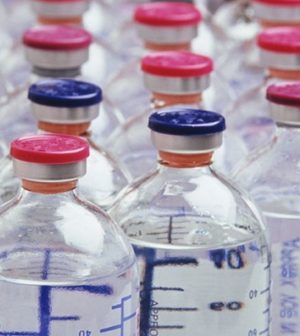- Recognizing the Signs of Hypothyroidism
- 10 Strategies to Overcome Insomnia
- Could Artificial Sweeteners Be Aging the Brain Faster?
- Techniques for Soothing Your Nervous System
- Does the Water in Your House Smell Funny? Here’s Why
- Can a Daily Dose of Apple Cider Vinegar Actually Aid Weight Loss?
- 6 Health Beverages That Can Actually Spike Your Blood Sugar
- Treatment Options for Social Anxiety Disorder
- Understanding the Connection Between Anxiety and Depression
- How Daily Prunes Can Influence Cholesterol and Inflammation
Already Had COVID? You May Not Need 2nd Dose of Vaccine

If you’ve previously been infected by the new coronavirus, just one dose of the two-dose Pfizer or Moderna COVID-19 vaccines may be enough to protect you from future infection, according to a new study.
“We showed that the antibody response to the first vaccine dose in people with preexisting immunity is equal to or even exceeds the response in uninfected people after the second dose,” said study co-author Dr. Viviana Simon. She’s a professor in the departments of microbiology and medicine at the Icahn School of Medicine at Mount Sinai in New York City.
“For that reason, we believe that a single dose of vaccine is sufficient for people who have already been infected by SARS-CoV-2 to reach immunity,” Simon said in a school news release.
Contact with the SARS-CoV-2 virus already activates the human body’s immune system response. But is that enough to forgo a dose of the new two-dose vaccines?
To find out, Simon’s group compared 109 people with and without prior coronavirus infection who received two vaccine doses.
Within days of receiving their first dose, the rate of antibody production was 10-20 times higher in previously infected people, compared to those who’d never been infected.
After the second dose, antibody production was more than 10 times higher in previously infected people than in those with no history of infection, the Mount Sinai researchers found.
“In fact, that first dose immunologically resembles the booster [second] dose in people who have not been infected,” study co-author Florian Krammer, a professor of microbiology, said in the release.
The findings were outlined in a letter to the editor published March 10 in the New England Journal of Medicine.
The findings could have implications for vaccine rollouts in the United States and around the world. Giving only a single dose of the Pfizer or Moderna vaccines to previously infected people would help stretch severely limited vaccine supplies, the research team said. It might also spare these individuals from the risk of unnecessary side effects from a second dose, which appear to be greater in previously infected people compared to those who’d never been infected, Simon’s group said.
Two-dose COVID-19 vaccines from Pfizer-BioNTech and Moderna received emergency use authorization by the U.S. Food and Drug Administration in December 2020 and have been given to millions of people nationwide.
Dr. Amesh Adalja is an expert in infectious diseases and vaccines, and is senior scholar at the Johns Hopkins Center for Health Security in Baltimore. He wasn’t involved in the new research, but said it offers “compelling evidence” that folks who’ve already been infected with SARS-CoV-2 might not need two doses of vaccine.
“This data is something that really could be integrated with vaccine rollout, because it is a way to increase the supply of doses and rapidly vaccinate the country,” Adalja said. He added that advisory panels to the U.S. Centers for Disease Control and Prevention will need to consider “this emerging data” in any revisions they might make to vaccination guidelines.
More information
The U.S. Centers for Disease Control and Prevention has more on COVID-19 vaccines.
SOURCES: Amesh Adalja MD, senior scholar, Johns Hopkins Center for Health Security, Baltimore; Mount Sinai, news release, March 10, 2021
Source: HealthDay
Copyright © 2026 HealthDay. All rights reserved.










